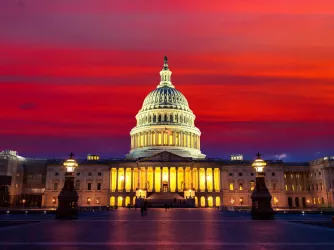Table of Contents
Free Speech Includes the Right Not Just to Speak But to Listen and Judge

The state of free expression on campus has been hotly debated in the media for months. In a recent salvo, Conor Friedersdorf’s March 8 article for The Atlantic titled “Free Speech Advocates Are Not Trying to Silence Students” listed the points of agreement and those of contention. Although the list of areas of dispute was long, Friedersdorf concluded that among observers “opining on campus culture,” a consensus exists that:
- Broad free speech rights and norms should be upheld.
- Student activists ought to be permitted to hold protests on their campuses, to criticize anything they want to as racist, and to make any demands that they like, regardless of whether the demands in question are liberal or illiberal.
FIRE endorses both propositions.
So if nearly everyone agrees that open discussion on campus is good, then why is free speech seen as a stumbling block to racial equality and other objectives? Perhaps because too much attention is paid to who is speaking rather than who is listening. Change requires both persuasive voices speaking and open-minded listeners. Protest in a vacuum will achieve nothing.
The freedom to speak also includes the freedom for others to listen. Justice Thurgood Marshall eloquently explained that “[t]he freedom to speak and the freedom to hear are inseparable; they are two sides of the same coin.” Kleindienst v. Mandel, 408 U.S. 753, 775 (1972) (Marshall, J., dissenting). The problem is that it is very hard to know when those who are listening are being swayed.
Every time a student writes an article about white privilege on campus, the first comment is often something to the effect of “grow up” or “get in touch with reality.” But if your reality is institutional racism, you want to change it, not accept it. So student activists naturally want to turn the volume up and get more attention to get their message across. Eventually their voices can’t get any louder. At that moment, turning down the volume on other voices starts to seem like an option and the calls for censorship begin.
But what about the listeners? Activists who advocate censorship are not thinking strategically about their audiences. As Frederick Douglass said in 1860 after an abolitionist meeting was broken up because the topic was “offensive”:
Equally clear is the right to hear. To suppress free speech is a double wrong. It violates the rights of the hearer as well as those of the speaker. It is just as criminal to rob a man of his right to speak and hear as it would be to rob him of his money. … When a man is allowed to speak because he is rich and powerful, it aggravates the crime of denying the right to the poor and humble.
Douglass was absolutely right. But it’s important to note that he didn’t say “the poor and humble” therefore have to right to silence the “rich and powerful.” That’s because those who are listening have a right to hear from both sides. And by hearing both sides the strength of one argument and the weakness of the other will become clear. So one story of racism, like the one Professor Shaun Harper told about a professor expressing surprise when an African American student got 100 percent on a test, may be dismissed as an anomaly. But what about the second or the fifth or the tenth or the fiftieth? If one side of the argument can pile up evidence, then the other side must respond. And if the response is silence, feeble rebuttal, or an attempt to change the subject, public opinion will shift.
To borrow from Maya Angelou, free speech, like “equal rights, fair play, justice, are all like the air: we all have it, or none of us has it. That is the truth of it.” That’s ultimately why censorship is self-defeating. If one side successfully stifles the views of their opponents, the other side will respond in kind. And the distorted debate will disillusion good-faith listeners until they give up, move on, and take the support for meaningful change with them.
FIRE, a free speech non profit, effectively and decisively defends the fundamental rights of tens of thousands of students and faculty members on our nation’s campuses while simultaneously reaching millions on and off campus through education, outreach, and college reform efforts.
Recent Articles
FIRE’s award-winning Newsdesk covers the free speech news you need to stay informed.

One day after FIRE lawsuit, Congress passes changes to filming permits in national parks

VICTORY: FIRE lawsuit leads California to halt law penalizing reporters, advocates, and victims who discuss publicly known information about sealed arrest records

O holy fight: New Hampshire Satanic Temple statue threatened by more than vandals
